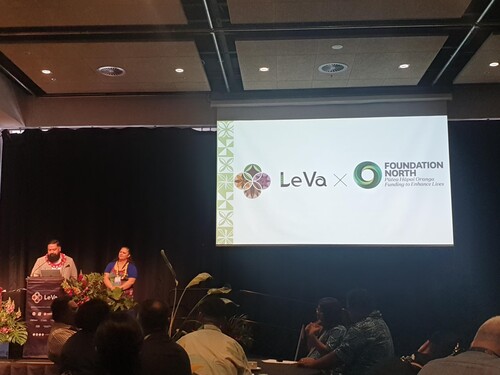Iwi led partnership presents bold response to Caulerpa threat

Foundation North has contributed, with other funders, to support a collaborative, Iwi-led business case which proposes a comprehensive response to the threat of Caulerpa.
Press release and graphic shared with permission of Ngāti Paoa Iwi Trust (released on 8 April 2025).
A new strengthened marine biosecurity approach has been proposed to combat the spread of invasive Caulerpa seaweed, described by independent scientific experts as “the most serious marine biosecurity incursion in our lifetime.”*
The proposal, developed collaboratively by Pou Rāhui iwi (Ngāti Pāoa, Ngāti Hei, Ngāti Tamaterā and Ngāi Tai ki Tāmaki), with input from Auckland Council, Waikato Regional Council and Northland Regional Council, alongside marine scientists, aims to address significant gaps in the current response system and protect the region’s valuable marine ecosystems and economy.
“The arrival of Caulerpa represents an unprecedented threat to our marine environment,” said Herearoha Skipper, spokesperson for Pou Rāhui iwi and Chair of Ngāti Paoa Iwi Trust. “We are deeply concerned about the lack of a comprehensive approach to fighting this seaweed species and its potentially devastating impact.”
Caulerpa monopolises seagrass habitats – reducing biodiversity through reducing food sources for juvenile fish, increasing the release of carbon, and having a toxic effect on native fauna and less resilient native species. This contributes to fewer commercial fisheries species and a potential reduction in taonga species like kina and scallops.
The affected area in the upper North Island contains 70% of New Zealand’s domestic maritime fleet, and contributes approximately one-third of the nation’s seafood industry GDP, and half of the tourism industry GDP. Economic modelling by NZIER suggests that without proper intervention, $9.4 billion of the region’s natural capital asset value could be lost over the next 30 years.
These findings are underpinned by a comprehensive business case prepared by independent consulting firm, MartinJenkins. The business case, which has been released today, sets out the options for addressing the spread of Caulerpa. It was developed over 4 months with iwi, community and industry impacted by the invasive marine pest, and input from councils. Contributions to costs were made by Foundation North, Tindall Foundation, Clare Foundation, Te Moananui o Toi Foundation, Auckland Council, Northland Regional Council, Waikato Regional Council, Thames-Coromandel District Council, and DoC.
“The business case presents a comprehensive picture of what could happen if we fail to act. It also exposes our inability to detect and respond to marine biosecurity threats effectively” said Herearoha Skipper.
The approach recommended by the business case is to establish a comprehensive response, estimated to cost between $30.8 and $43.0 million per year over the first five years, funded through a combination of taxpayer contributions, local rates, and vessel levies. Intervention could mitigate between $2.5 and $2.9 billion in estimated losses over 30 years.
“Our analysis demonstrates that investing early in good science and eliminating invasive Caulerpa will provide the best return on investment.”
“We need a strengthened marine biosecurity framework to coordinate a scaled-up fight against Caulerpa” said Herearoha Skipper.
“Pou Rāhui iwi met with Minister Hoggard, the Minister of Biosecurity. While we were heartened by his understanding of the issues, we are concerned with the lack of momentum behind the work, and we look forward to a more formal response from Government” said Herearoha Skipper.
* Experts include University of Waikato Marine Scientists Professor Kura Paul-Burke and Professor Chris Battershill, and Massey University Emeritus Professor Barry Scott.




